Pruning Techniques
Keep Your Garden Flourishing + Pruning Techniques
Tips for a Flourishing Garden
Having a beautiful and flourishing garden requires a combination of care, attention, and knowledge. Here are some essential tips to keep your garden looking its best:
1. Regular Watering
Make sure to water your plants regularly, especially during hot and dry periods. Be mindful of the specific watering needs of each plant.
2. Proper Sunlight
Ensure that your plants receive adequate sunlight based on their individual requirements. Place sun-loving plants in sunny spots and shade-loving plants in shaded areas.
3. Nutrient-Rich Soil
Use high-quality soil and consider adding organic matter or fertilizer to provide essential nutrients for your plants to thrive.
4. Weed Control
Regularly remove weeds that compete with your plants for nutrients, water, and sunlight. Mulching can help prevent weed growth.
5. Pruning and Deadheading
Regularly prune your plants to promote growth, remove dead or diseased branches, and maintain shape. Deadheading flowers can encourage new blooms.
Pruning Techniques
Pruning is a crucial gardening practice that helps maintain plant health, control growth, and enhance the overall appearance of your garden. Here are some common pruning techniques:
1. Cleaning Pruning
Remove dead, diseased, or broken branches to prevent the spread of infections and improve air circulation within the plant.
2. Thinning Pruning
Thin out crowded branches to allow more light and air to reach the inner parts of the plant, promoting healthy growth.
3. Heading Pruning
Heading cuts involve removing a portion of a branch to encourage new growth in a specific direction. This technique is often used to shape plants and control their size.
4. Pinching
Pinching involves using your fingers to remove the tip of a young plant's stem. This technique helps promote bushier growth and can prevent leggy growth.
5. Rejuvenation Pruning
For overgrown or neglected plants, rejuvenation pruning involves cutting back the plant significantly to stimulate new growth and restore its health.

By following these tips for a flourishing garden and mastering various pruning techniques, you can ensure that your garden remains healthy, vibrant, and visually appealing throughout the year.
